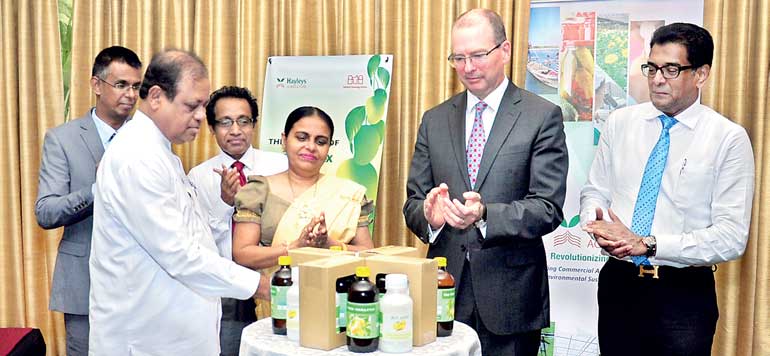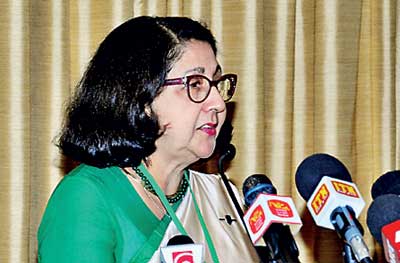Saturday Feb 21, 2026
Saturday Feb 21, 2026
Tuesday, 27 March 2018 00:06 - - {{hitsCtrl.values.hits}}
 Ministry of Science, Technology and Research Minister Susil Premajayantha, High Commission of Canada in Sri Lanka High Commissioner David McKinnon Ministry of Science, Technology and Research Secretary W. M. K. S. D. Wijebandara, Haileys Agriculture Holding Limited MD Rizvi, Industrial Technology Institute Director General G. A. S. Premakumara and Industrial Technology Institute Chairman Niroshana Perera launch the new product.
Ministry of Science, Technology and Research Minister Susil Premajayantha, High Commission of Canada in Sri Lanka High Commissioner David McKinnon Ministry of Science, Technology and Research Secretary W. M. K. S. D. Wijebandara, Haileys Agriculture Holding Limited MD Rizvi, Industrial Technology Institute Director General G. A. S. Premakumara and Industrial Technology Institute Chairman Niroshana Perera launch the new product.
By Shannon Jayawardena
Hayleys Agriculture and the Industrial Technology Institute (ITI) together launched two innovative products, namely Bio wax and Tree Fresh Formulation (TFF) last week, taking food security in Sri Lanka to greater heights.
Minister of Science Technology and Research Susil Premajayantha said: “I found that the development of these products to minimise the postharvest loss and maintain the quality of fruits and vegetables is done through nano-technology, which is truly a great achievement. Today, especially with the climate change effects, priority must be given to food security. That is very important.”
In Sri Lanka, postharvest loss of fruits is estimated to be around 30-40% hence these products are aimed at developing natural wax emulsions used as protective coatings to slow down natural ripening, minimise moisture loss and pathogen infection. Reducing loss of produce and increasing the productivity of cultivations will not only increase farmer income but the availability of fruits of consumers as well.
High Commissioner of Canada to Sri Lanka David McKinnon stated: “Most locals don’t realise that many of them have a bit of Canadian agriculture in their lives because we supply about 80% of the wheat that comes into the country. So I really like the idea that this is a project which might help bring Sri Lankan produce to the plates of the Canadians.”
The slow release mechanism of the active ingredients in the bio-wax plays a key role in preserving the shelf life by minimising loss due to diseases. The bio-wax formulation is made of beeswax, cinnamon bark oil and other ingredients. The efficiency of wax application on storage life extension was first tested on TJC, Karuthakolomban varieties and on a red lady papaya variety. Randomly selected replicate fruits were then dipped in wax for 30 seconds, allowed to dry and stored at 13.5 C. Fruit quality parameters were assessed after 7, 14 and 21 days of storage. Therefore it was observed that both mango and papaya treated with the wax showed better fruit quality compared to control fruits. Results indicate that storage life of bio-wax coated fruits could be extended for more than 21 days.
Hayleys Agriculture Managing Director Rizvi Zaheed noted: “The spirit of the Public-Private Partnership hasn’t gathered enough momentum in order to bring benefits to the people of our country. However, the research institutes in Sri Lanka where agriculture is concerned have worked in some ways to form partnerships to create better productivity to farmers and the country in general. The Bio wax and TFF have the makings of giving a strong contribution to the agriculture sector.”
The postharvest loss in the country is mainly due to the poor management of produce after harvest which in turn results in physical injury, moisture loss and micro diseases. Further according to research conducted at the University of Guelph in Canada, it is known that hexanal is a Phospholipase D inhibitor which prevents fruit membrane degradation.
Project Consultant Face One Shanthi Wilson said: “This is indeed a very special thing for us, for enhancing the preservation of fruits in South Asia using nano-technology. It was an international collaborative program financially supported by the Government of Canada.”
Pix by Sameera Wijesinghe